Lessons of the Field | Maine’s Aroostook County Potato Harvest
In Maine’s Aroostook County, everyone chips in during fall potato harvest.
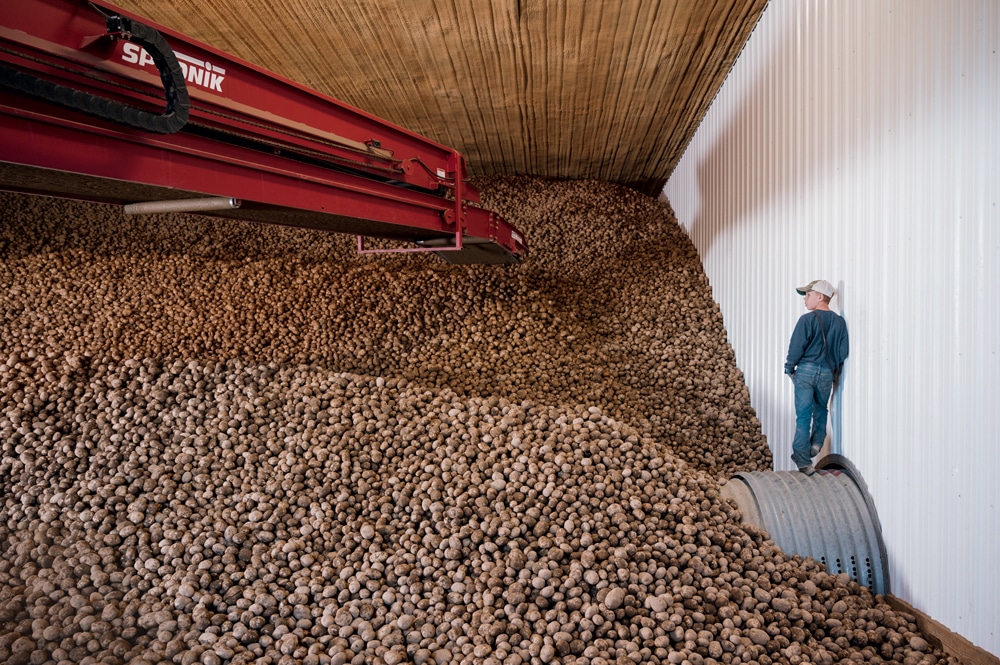
Colin McCrum, 10, keeps an eye on a bin piler as it loads potatoes into a warehouse at County Farms. His father, Darrell McCrum, is co-manager of the farm and a fifth-generation member of the McCrum family running what is now one of Maine’s largest potato operations.
Photo Credit : Tristan Spinski
Photo Credit : Tristan Spinski
By Erin Rhoda
On the first day of last October, Lane McCrum steadied his tractor on the slick earth of one of his family’s 4,600 acres of potato fields in Maine. He was pulling a windrower, a giant machine that scoops up multiple rows of potatoes and spills them into a line on the ground to then harvest. The job meant Lane had a great deal of responsibility, particularly for a 17-year-old.
Looking out from the tractor cab, the high school junior from Mars Hill could see how much work he and his family had left to collect Maine’s most valuable agriculture crop—in weather that was barely holding. The clouds darkened.
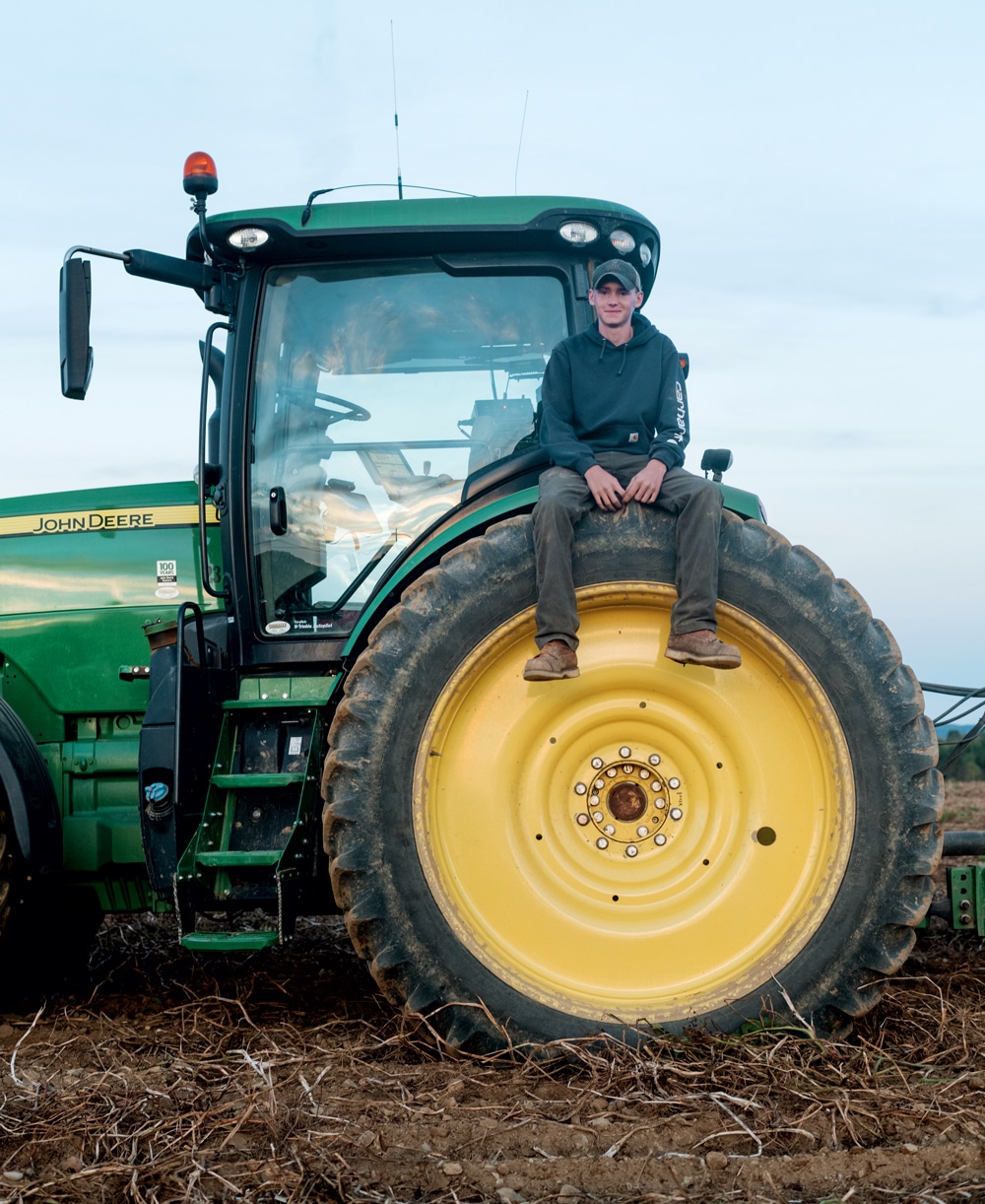
Photo Credit : Tristan Spinski
Every year Maine’s potato harvest is a battle against time and the elements. The farms—all of which are run by families—typically have only three weeks in September and October to pull the potatoes from the ground before colder weather brings a frost. During those weeks, entire communities in Maine’s northernmost county, Aroostook, which grows the vast majority of Maine potatoes, turn to the task. Children and teenagers, too.
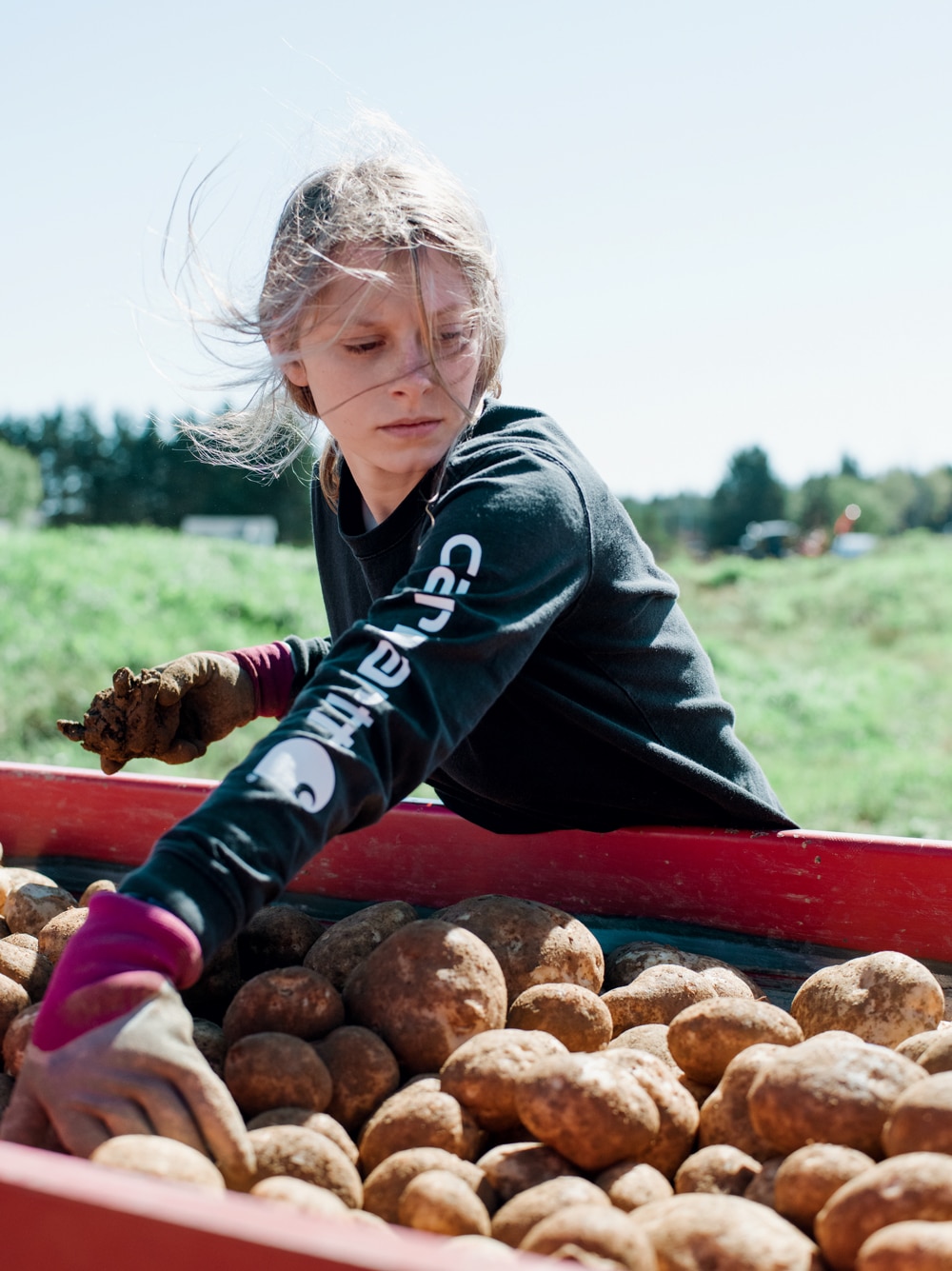
Photo Credit : Tristan Spinski
With only 10 people per square mile in Aroostook County, potato farmers have an urgent and temporary demand for labor. That’s why for decades many of the schools shut down for what is called the potato harvest break. Instead of going to class, kids like Lane drive tractors, steer trucks carrying 30,000 pounds of potatoes, operate forklifts at the warehouses where potatoes are stored, separate rocks from potatoes on conveyor belts, and clean the potatoes before they are shipped.
Breaking from school for the harvest is a tradition that people in “the County” acknowledge likely won’t last forever, however. As farming technology improves, fewer students are needed, prompting more school districts to drop the break. Working on a potato farm is an education all its own, though, making both farmers and educators lament the thought of losing the kids’ involvement.

Photo Credit : Tristan Spinski
“Even though they’re not in a classroom,” said Bobbi McCrum, Lane’s mother and a teacher at Central Aroostook Junior-Senior High School, “they’re learning.”
At County Farms, a multigenerational potato farm based in Mars Hill that’s run by the McCrum family, kids from the surrounding area can work 12 hours a day, six days a week, in the cold, heat, dust or, as was the case for a few days early last October, mud. The lessons are real and immediate. Some people speak wistfully of the potato harvest of decades past, when people picked potatoes by hand. But the work was backbreaking, and no one is working today for nostalgia’s sake.
“That’s not the reason we’re doing it. We’re doing it because kids learn the value of hard work. They earn money. They’re providing a huge service to the farmers. We’re so appreciative of it,” said Nick McCrum, who is married to Bobbi and runs County Farms with his cousin, Darrell McCrum.
Lane was responsible for digging up six rows of potatoes at a time and depositing them into a long line that filled three additional rows. Paired with another windrower, which also dropped them into the same line, a harvester could then scoop up 15 rows of potatoes at once.
The process requires precision.
“If you stop paying attention, things start breaking,” Lane said, as he alternated between looking ahead, checking a screen that showed the potatoes traveling up metal tracks and down a chute to the ground, and watching the progress of the other windrower next to him and the harvester behind him. The harvester poured potatoes into a waiting potato truck, the two moving in tandem down the rows. “I like doing this a lot,” Lane said. “You get to learn things you wouldn’t learn in school.” One such lesson is how to diagnose problems, he added.
At that moment he stopped the tractor, unwittingly showcasing his point. “I’ve got to get out real quick,” he said. Outside, he used a metal rod to clear out potato vines from a wheel that turned a component of the windrower. Back in the cab, we stayed in place, waiting for the harvester behind us. The rows seemed unbounded, and it was only one field; his family farms potatoes in nine towns in Aroostook County alone.
Adding to Lane’s problems, rain began to fall. Farms can’t store wet potatoes or else they might rot, making rain an enemy of the harvest. The harvester needed to stay close, so the newly unearthed potatoes wouldn’t get soaked. But as the harvester approached, we could see the potato truck next to it was full. Workers rolled a tarp over the truck to keep the collected tubers dry, and it headed back to the potato warehouse to unload. The potatoes Lane had already dug up lay exposed to the drizzle.
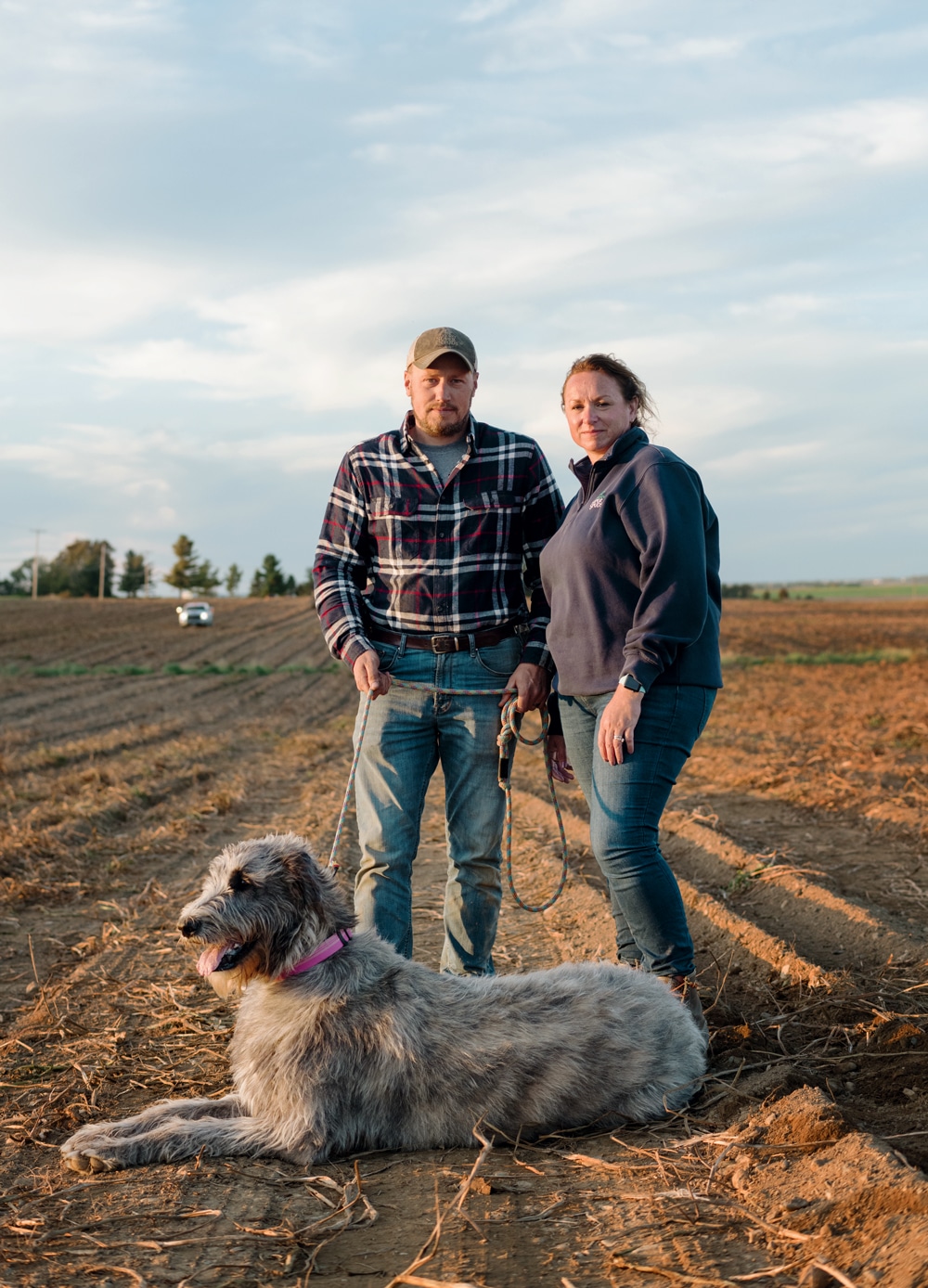
Photo Credit : Tristan Spinski
Ask teenagers or preteens what the harvest break teaches them, and they usually talk about the value of hard work. But spend time with them, and it becomes clear that the work often involves troubleshooting and dealing with less-than-ideal circumstances, which leads to something else: resilience.
“You’re going to have long days and not very good days, but that’s all part of it,” Lane said. “When something breaks, you can’t do anything about it. You’ve got to stick with it and do everything to fix it. Not every day will be as good as you planned it.”
Taking a pause from school doesn’t just help farmers get in their crop. It also helps students like Lane learn essential parts of the family business, so one day he might run it, which he hopes to. He or his brothers would be the sixth generation of McCrums to grow potatoes. I asked Lane what he didn’t know about the farm. “Really anything you can think of,” he said. “I learn new stuff all the time.”
As we waited for another potato truck to arrive, Lane showed me what his heavy equipment could do. An auto-steer feature allows the tractor to move through a field without a human holding the steering wheel. That’s why the rows are so straight, he said: They’ve been planted by technological design. In his right hand was a remote that controlled the windrower’s boom, spade, and steering. A digital display told him how much fuel he had left, the temperature, and many other measurements. What’s more, the harvester behind us evolved from earlier models that required people on them—often kids—to pick out rocks. Today the harvesters are so efficient at funneling out the rocks that there’s not even a place on them for people to sit, Lane said.
But potatoes are still not impervious to too much rain. With the storm worsening, Lane and all the other workers would have to stop for the day, after being out for only a few hours. The ground was muddy, but Lane knew how to keep up enough momentum to prevent his machines from getting stuck as he exited the field. He had done this before.
As mechanization keeps changing the industry, and a declining number of students work the harvest, Don Flannery, executive director of the Maine Potato Board, can envision when the harvest break will no longer happen. “I think for the next few years you’ll continue to see it. I think at some point in time it probably will no longer exist. But is that within the next five years? Probably not. Is it within the next 20? Probably.
“Someday it’ll be a story that we’ll tell our grandkids,” he continued. “It won’t be anything they’re very familiar with or have ever seen at some point in time.”
Maine School Administrative District 42, based in Mars Hill and home to the McCrums, and the nearby Easton School Department are the only two out of 14 districts where all students have a three-week harvest break, according to Ben Sirois, president of the Aroostook County Superintendents Association. Students start school at the beginning of August, so they can break in late September and early October. MSAD 42 Superintendent Elaine Boulier, who started in the district in 1986 as a first-grade teacher, said the break does not harm student academics. “It teaches an unbelievable work ethic. It teaches kids about time management, money management. It gives them an experience they won’t forget,” she said.
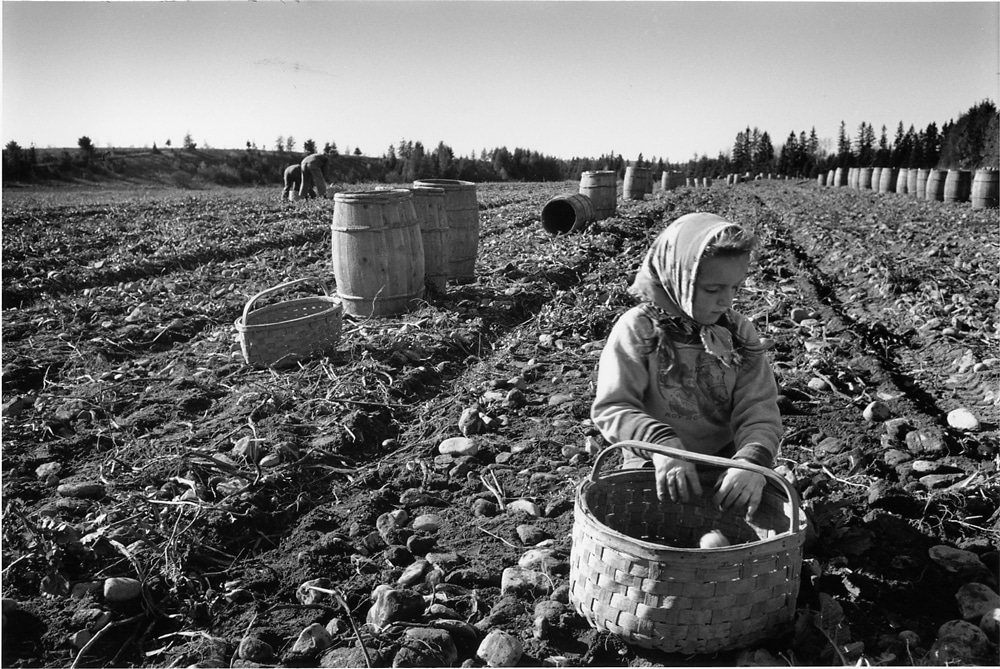
Photo Credit : Aroostook County Potato Picking, Maine, 1954. Photograph by Verner Reed; © Historic New England
Boulier knows the harvest well. She grew up an hour and a half north of Mars Hill, on a potato farm in St. David, and used to wake up at 5 a.m. to be in the fields by 6 a.m. for the harvest, just as students do today. Sometimes, when the machinery got stuck in the mud or broke down, and work stopped, she would lie between the rows, her face to the sun, to take a nap.
Despite the grueling work schedule, there is also camaraderie.
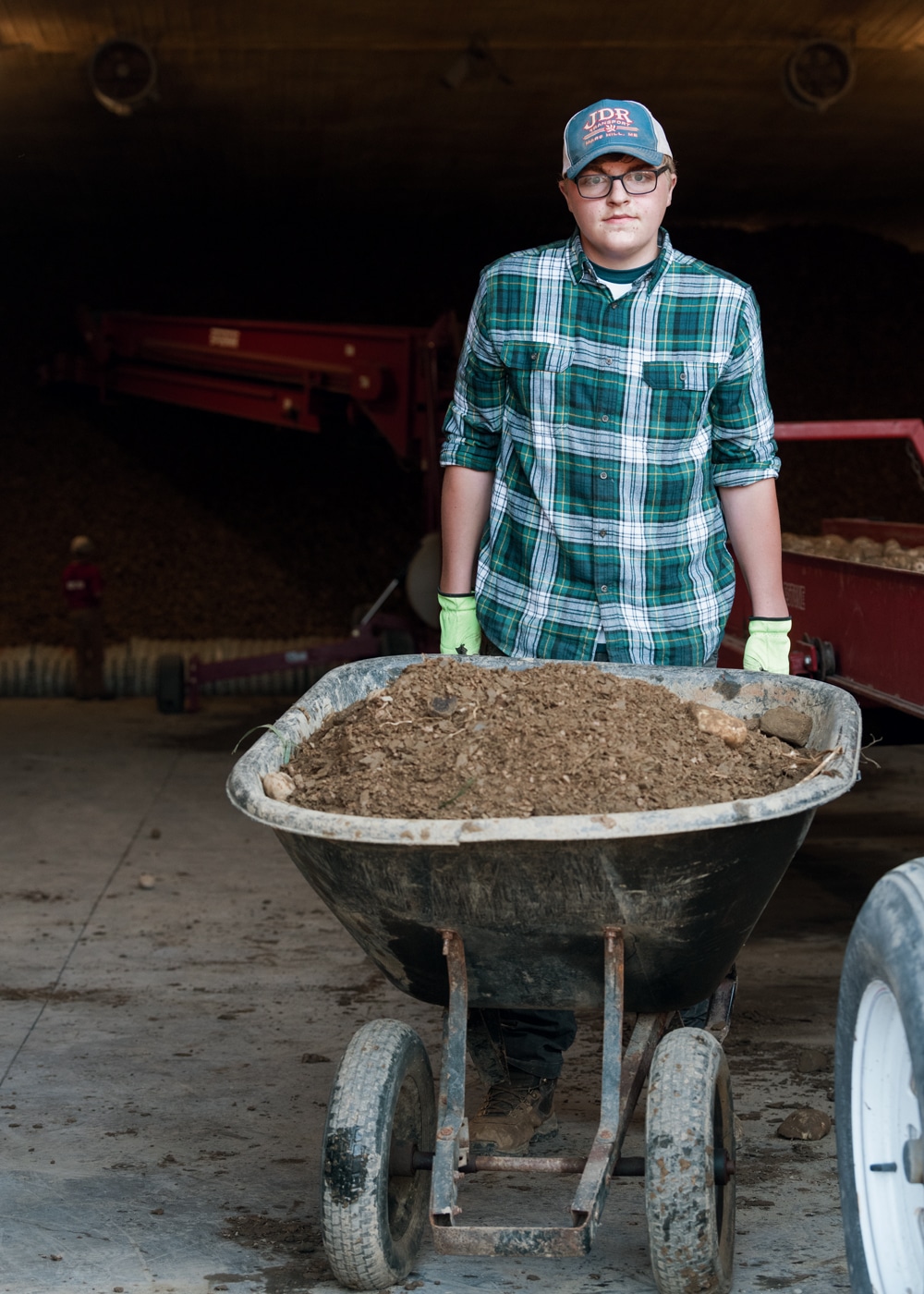
Photo Credit : Tristan Spinski
“It’s my favorite time of year,” said Colin McCrum, 10, of Mars Hill, whose father, Darrell McCrum, is co-manager of County Farms. He enjoys seeing his friends and being part of the operation. “It keeps me busy, and I like that.” Before the rain shut down work on this day, Colin had a lot to do, including running a stinger, which funnels the potatoes from trucks onto a conveyor belt, and a bin piler, which empties the potatoes from the conveyor into a potato house. The potatoes had been “pretty muddy” that day, he said, but “they’ll be OK.” When there was a lull, he cleaned up the dirt that had accumulated on the ground and in the warehouse. Otherwise, it would reach his waist, he said.
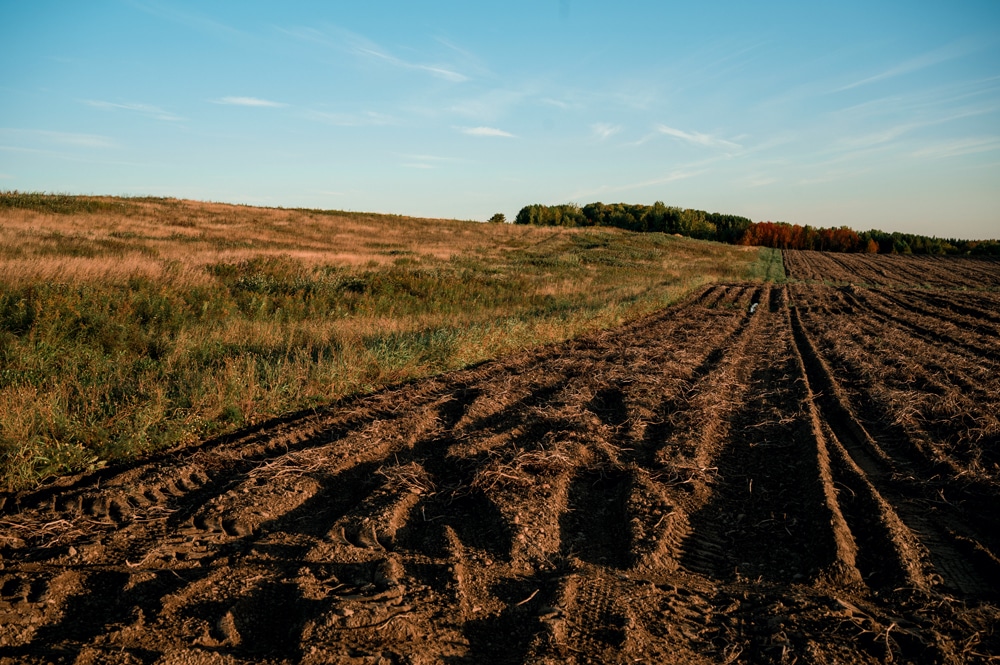
Photo Credit : Tristan Spinski
Nearby, Audrey Milliard, 15, of Mars Hill worked her first harvest as a racker—someone who picks off rotten potatoes, rocks, and clumps of grass from the conveyor belts heading to the potato warehouse. “If you have the opportunity, take it. Work. You’re only young for so long, and this is an experience that a lot of the older generation had,” she said.
Most of the students said they planned to save their money—which averages out to $3,000 each for the three weeks—for college, or to buy a car, a snowmobile, or basketball cards.

Photo Credit : Tristan Spinski
The following morning, work started late, 8 a.m., to let the fields dry out. But it didn’t prevent several trucks from getting stuck in the mud. By 9:30 a.m., Abram McCrum, 15, had avoided such a fate, but he had a different problem. Oil had been leaking from the truck he normally drove, so he was left with a truck of last resort that didn’t like shifting into gear. It sounded like giants grinding their teeth. “It’s not that bad once you get used to it,” said Abram, who had learned to drive a standard the previous year. As one of five high school students driving potato trucks, out of 25 trucks total, he had gotten a special permit to operate the vehicle for work; he didn’t have a driver’s license yet.
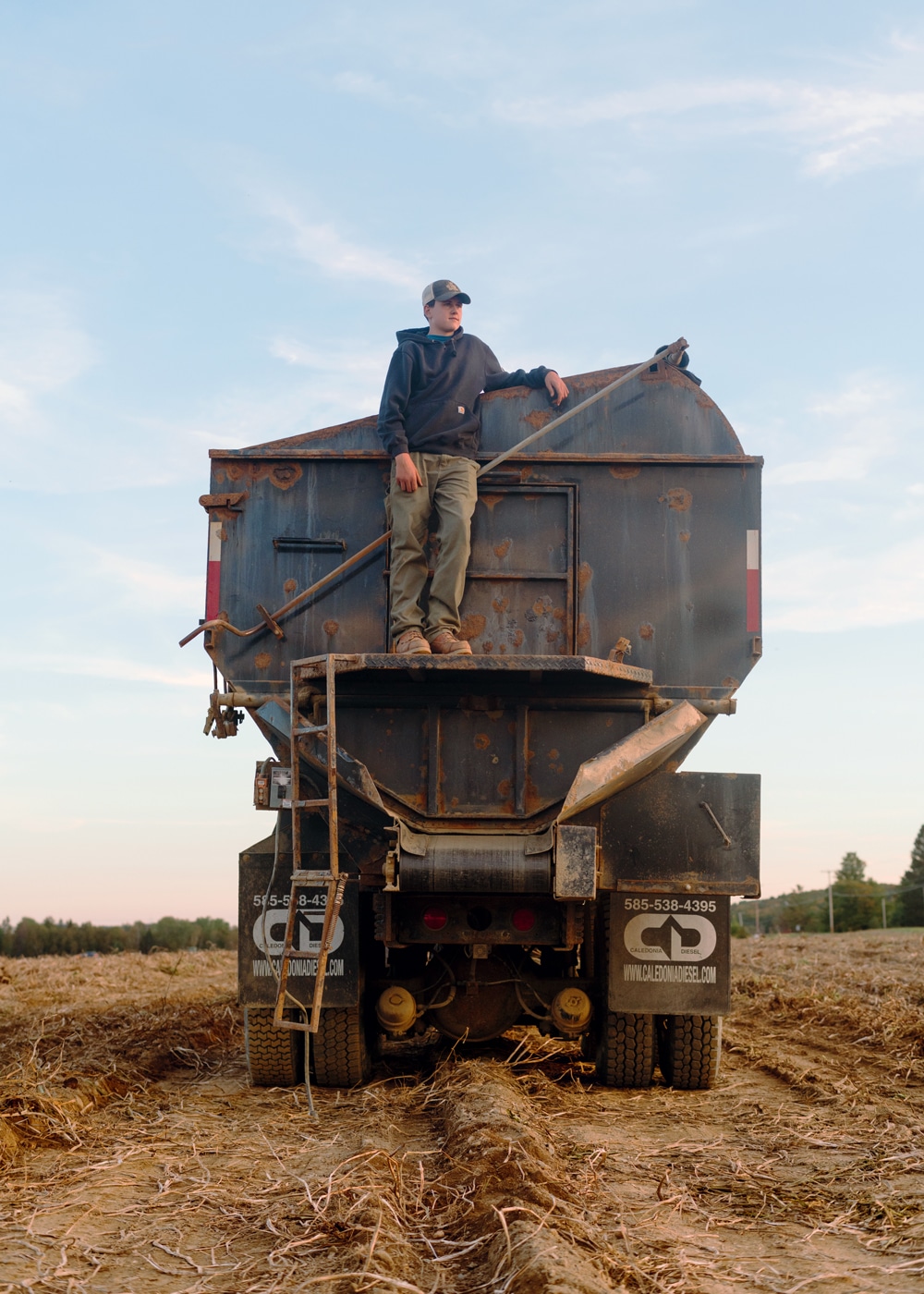
Photo Credit : Tristan Spinski
As the middle son of the McCrums, he also hopes to continue working on the farm long-term, he said, as we drove down the road to pick up a load of potatoes from the same field Lane had dug the previous day. “It’s a family business, and I want it to keep going. I like farming,” Abram said. We passed several Amish neighbors steering their horses and buggies down the road. Abram waved to each one.
The gears creaked as he slowed down to turn onto the potato field, and the sound worsened to a scraping noise as he switched to field gear. “It doesn’t like to shift in the field gears,” Abram said, as he drove slowly through the field of potatoes.
He pulled up next to a tractor pulling a harvester, and it began dumping potatoes into the back of his truck. Despite thousands of pounds of potatoes falling behind us, all we could hear was the rumble of the truck and the tractor next to us. We crept forward along the row. After 10 minutes, the man steering the harvester waved to Abram to tell him the back of the truck was full. Abram’s gearshift scraped again as he pulled ahead.
As we drove back to the warehouse, a blue truck passed us, heading in the other direction. It was the one Abram normally drove. It was 10:37 a.m., and the truck appeared to have been fixed already. It felt like a good omen. Riding high above the other cars, we could see the sun filtering between the clouds. The weather had turned.
Abram pulled into his family’s gravel parking lot and backed up to the stinger to unload, as he would continue to do again and again. The crop would prove bountiful after all, gathered by people younger and older who steadied themselves to the task, learning from one another and the earth that was their classroom.


